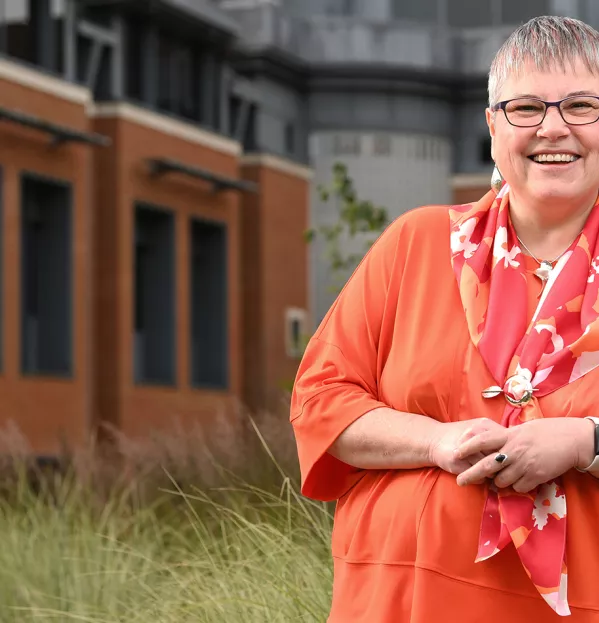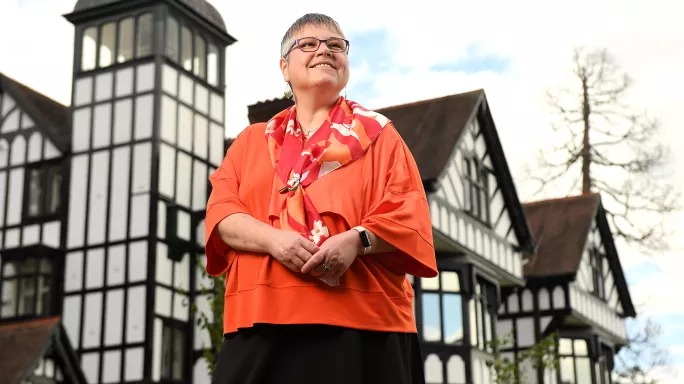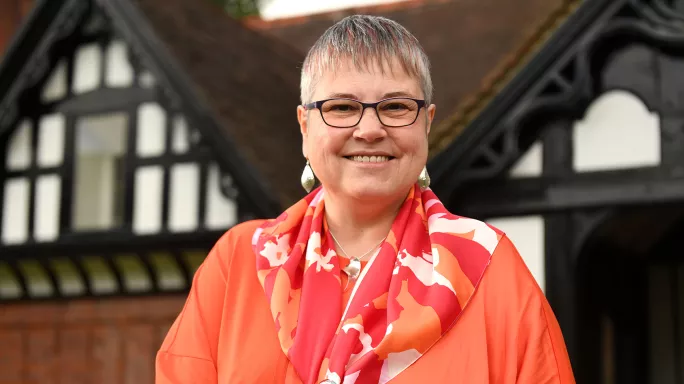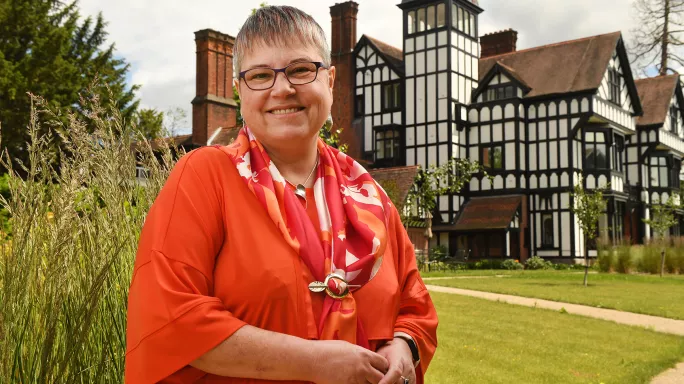10 questions with... Carole Willis

Carole Willis is chief executive of the National Foundation for Educational Research (NFER) and was previously chief analyst and chief scientific adviser at the Department for Education.
She spoke to Tes for our popular 10 questions series to talk about her own time in education and the teachers that had an impact on her life - and why lunchtime discos remain such a fond memory.
She also talks about the pride she has in the work that the NFER does, why we must do more to tackle educational inequalities, and why teams working together can achieve anything.
1. Who was your most memorable teacher?
I do have a few. The first one to mention is Mr Payne who was my A-level economics teacher. I really enjoyed the subject and he really brought it alive - he had a great sense of humour!
I also remember Miss Cod - my German teacher in second grade. She had a really interactive and memorable teaching style. She used to create a lot of her own teaching resources at home, so we’d get these strange drawings of things that would help us remember different vocabulary in German.

And then the last one is Mr Collis who was my music teacher in middle school. He encouraged me to join a choir, supported me in getting violin lessons and enabled me to have access to a violin because my parents wouldn’t have been able to afford to buy me one. I really got into music, even though I had zero ability, but it helped broaden my horizons.
2. What were the best and worst aspects of school?
The best things were my teachers and seeing my friends. We also used to have a Friday lunchtime disco every week, which I really enjoyed! Que Sera Mi Vida (If You Should Go) by the Gibson Brothers was one of my favourites. And dancing along to The Eton Rifles by The Jam (although I didn’t understand all the lyrics at that point)!
The worst thing, though, was PE. I’ve never quite been built for physical activity. I hated cross-country runs, but luckily my violin lessons would sometimes clash with my PE lessons so I managed to escape from a few of them, which was even more reason to learn the violin.
3. Why do you work in education?
Because I’m really passionate about that crucial start for young people.
It almost seems to me that it is - apart from climate change - the longest-term issue in government. What happens to children in those first 16 to 18 years determines their whole life. It’s critical for their employment, for their wellbeing, for their health, for whether or not they get involved in crime or the criminal justice system. So it’s hugely important.
There’s enormous potential to undertake research in education to understand more about children’s development: about what kinds of policies, approaches, and practices can help them have better outcomes with a better future life.

There’s an enormous amount of data, particularly in England, and it has been relatively underexploited, certainly, until the last five to 10 years. There were very few economists working in education when I joined the DfE 13 years ago.
That’s increased and changed, but I still think there’s a lot of untapped potential to understand more about education and use that to improve the way in which education is delivered.
More from the series:
- 10 questions with... Professor Geraint Jones
- 10 questions with... Colin Bell
- 10 questions with... Caroline Derbyshire
4. What are you proudest of in your career?
I think the thing I’m most proud of is the way in which NFER has developed over the last eight and a half years…It has been such a huge honour and privilege to lead such an amazing organisation with such talented people. We’ve been working hard to increase the relevance and the reach of our findings, and to focus on the key issues in education where we can add the most value.
We’ve also been trying to encourage our researchers to be braver about drawing out the key insights from our research and actively engage with stakeholders to help to inform decisions.
I used to say there was no point in drafting research reports that just sat on dusty shelves. I guess there’s a better analogy now about “reports on hard drives”. I want those insights to be out there, to be discussed, to inform the debates and inform decision makers…about how they can make those decisions to improve education.
We did a lot of research [during Covid] to understand and shine a light on the challenges that schools and pupils were facing. And we’ve been able to use our assessment expertise and our research expertise to look at areas where children’s learning could be supported, where were the key gaps and what kinds of measures might help support the recovery process.
5. What would your perfect school staff room be like?
It would definitely be full of NFER research reports, particularly the ones that are aimed at practitioners!
It would have a full complement of well-paid teachers who had manageable workloads. Plus there would be really good coffee, chocolate biscuits, a fruit bowl...and teachers would be having discussions about how fantastic the progress was that their children were making.

6. What do you think are the best and worst aspects of our school system?
The best aspect without a shadow of a doubt is the huge dedication of our teachers and school leaders.
Our research during Covid highlighted the enormous lengths they were going to to support children and their families. In our research, we even found examples where schools were helping families pay the bills. It’s just incredible.
The worst is about the differences in outcomes for children from disadvantaged backgrounds compared to their peers.
And whether you look at attainment or progress or the destinations young people go to after they leave school, children from disadvantaged backgrounds always fare worse.
The gap between them and their peers widens during their school careers. Education isn’t the only thing that can help children escape poverty, but it is really important.
7. Your own teachers aside, who has influenced you the most?
I’ve learned a lot and have huge respect for a whole range of people in education and there are too many to list here. But the person whose name immediately sprang to mind is David Bell.
He is now vice-chancellor at Sunderland University, but when I was at the DfE he was the permanent secretary and he had a huge amount of integrity.
He had this incredible ability to know the name of every single person in the DfE…He made people feel special and valued. And I often think about him and how I can learn more from him for my leadership style.
8. If you became education secretary tomorrow, what would you change?
What I would do - and the more I think about this, the more excited I get - is to establish an Opportunity Task Force.
This would have the task of looking at how to reduce the impact of disadvantage on children’s education, funding, how to get really good teachers into deprived areas, and qualification routes, all the way through to government policies to tackle the underlying causes of poverty.
This wouldn’t be another social mobility commission: it would be a task force based within the DfE, so it has the opportunity to directly affect change and to look at new policy thinking within the department, as well as existing policies.
It would also have membership from other government departments…and would need to have a set of success measures around children’s academic progress and their wider development, and then destinations.
I think a really clear, powerful senior-level group looking at those issues constantly for a period of time would help to shape everything that DfE and other departments do. To look at those policies through the lens of disadvantaged pupils and how to support them - I think that could be really powerful.
9. Who’s made the biggest difference to education in the last 12 months?
I’m going back to NFER because I’d like to think we have made a big positive difference to education through our insights, our research, and our assessments…to be able to quantify the scale of missed learning and the need for recovery [after Covid] has been really powerful in informing the government’s willingness to put any money into recovery, rather than thinking children would go back to school and everything would be ok.
10. What’s the most important lesson you’ve learned with the job?
I’ve got one simple thing to say. If you have an excellent team behind you, all working toward the same objective, then you can achieve anything.
Carole Willis was talking to Matilda Martin
You need a Tes subscription to read this article
Subscribe now to read this article and get other subscriber-only content:
- Unlimited access to all Tes magazine content
- Exclusive subscriber-only stories
- Award-winning email newsletters
Already a subscriber? Log in
You need a subscription to read this article
Subscribe now to read this article and get other subscriber-only content, including:
- Unlimited access to all Tes magazine content
- Exclusive subscriber-only stories
- Award-winning email newsletters
topics in this article



